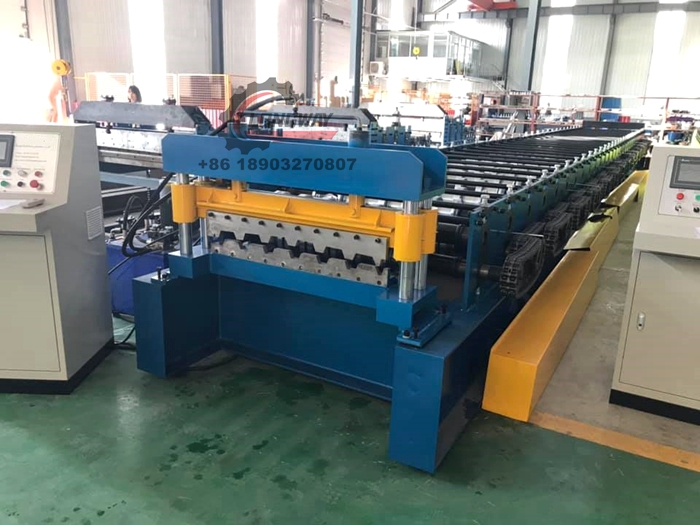Roofing Roll Forming Equipment for Efficient Deck Production and Installation Solutions
Understanding Roof Deck Roll Forming Machines
The construction industry constantly seeks innovation and efficiency, and this is where roof deck roll forming machines come into play. These specialized machines have become integral in the production of metal roofing systems, particularly in commercial and industrial applications. This article will explore the working principles, types, advantages, and applications of roof deck roll forming machines.
What is a Roof Deck Roll Forming Machine?
A roof deck roll forming machine is a complex piece of equipment designed to create metal panels used as structural roofing systems. It operates by feeding metal sheets, commonly made from steel or aluminum, through a series of rollers that progressively shape the flat sheet into a desired profile. The machine generally includes features such as a decoiler (which unwinds the metal coils), forming rollers (that shape the material), a cutting mechanism (for length-specific panels), and a stacker (to organize finished products).
Working Principles
The process begins with large coils of metal being fed into the decoiler. The machine unwinds the coil, guiding it through the forming rollers. Each roller is designed to exert pressure on the sheet to mold it into specific shapes, such as ribs and valleys that enhance strength and water drainage capabilities. The number of rollers and their configurations depend on the specific panel profile designed for roofing.
Once the sheets are fed through the rollers, they are cut to specific lengths based on architectural requirements. This is done using a hydraulic or electric cutting mechanism that ensures precision. Finally, the finished roof deck panels are stacked and prepared for shipment to construction sites.
Types of Roof Deck Roll Forming Machines
There are different types of roof deck roll forming machines tailored to produce various profiles and dimensions. The most common types include
1. Composite Deck Roll Forming Machines These machines manufacture panels that can support loads while minimizing weight, often used in multi-story buildings. 2. Nesting Deck Roll Forming Machines These create panels that can be stacked for transport, optimizing space without compromising material quality.
3. Steel Deck Roll Forming Machines These are specifically designed to produce lightweight yet sturdy steel decks used in commercial roofs and floors.
4. Custom Profile Roll Forming Machines For unique architectural projects, these machines can be tailored to create bespoke panel designs as per client specifications.
Advantages of Roof Deck Roll Forming Machines
roof deck roll forming machine

The use of roll forming technology in producing roof decks comes with numerous advantages
- High Efficiency The automated nature of these machines allows for high-speed production, significantly reducing labor costs compared to traditional manual methods.
- Consistency and Quality Roll forming ensures uniformity in each panel produced, which is crucial for structural integrity. The precise engineering involved also minimizes waste materials.
- Durability and Strength Panels produced through roll forming are often more robust than those fabricated using other methods, accommodating various environmental factors like heavy rain or snow.
- Versatile Designs Roll forming can be adapted to create a wide range of profiles and thicknesses, catering to different architectural requirements.
Applications
Roof deck roll forming machines cater to numerous applications across various industries
- Commercial Buildings Used extensively in shopping malls, warehouses, and office buildings for efficient roofing solutions.
- Residential Projects Increasingly, builders adopt metal roofing systems in upscale residential homes due to their aesthetic appeal and longevity.
- Industrial Facilities Factories and plants require robust roofing systems to withstand heavy machinery and operational wear and tear.
- Parking Garages The strength and lightweight properties of metal panels make them ideal for constructing parking structures.
In conclusion, roof deck roll forming machines have revolutionized the way roofing systems are manufactured in the construction industry. Their ability to produce high-quality, consistent panels efficiently makes them an invaluable asset for architects and builders. By embracing this technology, construction professionals can ensure that their projects are completed with precision and strength, ultimately leading to safer and more durable structures.
-
Roof Panel Machines: Buying Guide, Types, and PricingNewsJul.04, 2025
-
Purlin Machines: Types, Features, and Pricing GuideNewsJul.04, 2025
-
Metal Embossing Machines: Types, Applications, and Buying GuideNewsJul.04, 2025
-
Gutter Machines: Features, Types, and Cost BreakdownNewsJul.04, 2025
-
Cut to Length Line: Overview, Equipment, and Buying GuideNewsJul.04, 2025
-
Auto Stacker: Features, Applications, and Cost BreakdownNewsJul.04, 2025
-
Top Drywall Profile Machine Models for SaleNewsJun.05, 2025








